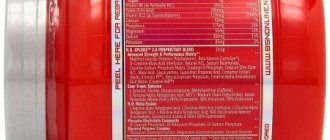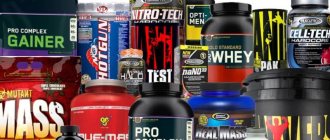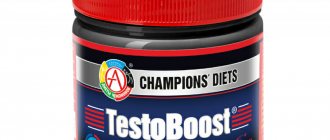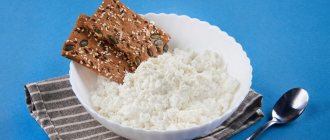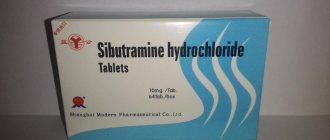Sports nutrition is a highly effective supplement to an athlete’s diet, containing the necessary biological substances for the fastest and highest quality effect. What effect do sports supplements provide? Different. Sports nutrition should be divided into groups:
- anabolic supplements;
- weight loss products;
- energy supplements;
- complexes aimed at improving health;
- and means that promote the production of your own testosterone.
Let's consider the types and best brands of sports nutrition, both domestic and global markets.
What is needed in sports nutrition?
Sports nutrition is an additional source of necessary substances in a form convenient for consumption. For example, for a person trying to gain weight, every calorie counts! To gain weight, you need to consume a large amount of proteins and even more carbohydrates, and it is very important to replenish the need for calories in a timely manner, say, immediately after a workout, and the athlete simply does not have the opportunity to eat within 40 minutes while the protein-carbohydrate window is open. That’s when all kinds of sports supplements come to the rescue, blocking or at least reducing catabolic processes in the body and speeding up recovery after heavy exercise.
Moreover, sports nutrition is made in such a way as to quickly deliver the necessary substances to the muscles, provide energy, or have different effects on the body in a short time. Or another example. For greater performance during training, there is a group of pre-workout complexes that are used immediately before training and provide the athlete with energy and quick recovery; due to this supplement, a person is able to train more intensely.
Amino acids.
The product is obtained through the process of hydrolysis (decomposition) of proteins, which are the building blocks that build muscles. There are two types of amino acids: nonessential and essential amino acids. The difference between them is that some can be synthesized by the body, while others enter it from food. Amino acids are available in the form of powder and tablets. Taken before training, during training and after training. This is done so that during exercise the muscles do not “eat” themselves, but take building material from amino acids. An excellent product for this are BCAAs, which often taste good and are taken during training instead of plain water. Together with BCAA, it is rational to take Glutamine, which is necessary for effective muscle growth and increased immunity.
The benefits and harms of sports nutrition
There are many benefits from taking sports nutrition. The main benefit is bringing the athlete closer to his cherished goal - strength and other sports indicators, volume of muscle mass, weight required for competition and excellent muscle quality. But even for amateurs, there are many advantages to taking sports nutrition. Sports supplements will help you reduce excess weight and strengthen not only your muscles, joints and ligaments, but also your overall health and immune system. And, of course, sports nutrition contributes to the gain of high-quality muscle mass and rapid recovery!
As such, there is no harm from sports supplements, unless, of course, a person has contraindications for taking them, or if they take sports nutrition for other purposes. For example, those who are trying to lose weight should stay away from sports nutrition groups that promote weight gain, and vice versa. To avoid such a misunderstanding, you need to have basic knowledge and at least understand a little about the types and purposes of sports nutrition.
Main types of sports nutrition
- Protein. The most common option. It is obtained by synthesizing soy products, eggs and whey. The main task of protein is to replenish the protein supply in the body. It is used to gain muscle mass, as well as in some weight loss methods, when you only need to lose fat while maintaining “quality” weight.
- BCAA. This is a complex of three vital amino acids. Allows muscles to grow faster, as it is instantly absorbed by the body.
- Creatine. The second name is “meat amino acid”. Easily absorbed by muscles, absorbs water. Mainly used for quick weight gain.
- L-carnitine. An amino acid that has become the best friend of those who lose weight. It is useless to take it without training: the weight will not go away. But coupled with going to the gym, L-carnitine can give quick and noticeable results.
- Gainer. This product is used when gaining weight. It will help you quickly reach the desired number of calories per day.
Which sports nutrition to take depends on your goals in the gym. But how to take sports nutrition depends on the supplement itself.
Types of sports nutrition
For convenience, sports nutrition should be divided into groups.
Weight Gain Supplements
- A gainer is a carbohydrate-protein mixture that provides a huge amount of additional calories to the main diet, mainly from carbohydrates. The supplement also contains proteins and fats in different proportions. Gainers are fast and slow, depending on the ratio of proteins and carbohydrates.
- Protein is real protein in a bioavailable form. In sports nutrition, a distinction is made between protein from plant and animal sources. The latter are more often used in sports due to their effectiveness. Just like gainers, proteins can be fast, obtained from whey, and slow, obtained from casein.
- Amino acids are the main building material for all tissues of our body. Amino acid complexes also differ. In some supplements you can find both non-essential and essential amino acids in one complex, or separately BCAAs - three essential amino acids with branched side chains. You can also find supplements for each amino acid separately.
- Creatine - used to produce ATP, which in turn provides fuel for muscles during prolonged and very intense exercise.
- Post-training nutrient complexes aimed at effective recovery after exercise.
- NO boosters are substances that precede nitric oxide. These substances act on the smooth muscles of blood vessels and increase blood flow to the muscles. Due to this, the muscles receive more nutrients. These additives are also called nitrogen donors.
Supplements for weight loss and fat burning
- Fat burners are complexes of substances whose action is aimed at launching the processes of lipolysis or thermogenesis. Through these processes, fat is burned.
- L-carnitine is a vitamin-like substance involved in energy production - transporting fatty acids to muscles and preventing the accumulation of fatty acids outside cells.
- BCAA - these essential amino acids have an active effect on metabolism, which helps improve lipid metabolism, so they are often taken not only when gaining weight, but also during the drying period. They also prevent catabolism.
Supplements that help strengthen the body
- Fatty acids - normalize metabolism, maintain health, integrity of cells and tissues, improve overall well-being and mood.
- Vitamin and mineral complexes - such supplements are simply a storehouse of useful biological substances for our body. Some vitamin complexes contain many active ingredients that, together with other supplements, have a powerful effect on the entire body.
- Antioxidants are free radical fighters. They help improve well-being, prevent the development of cancer, and also prevent aging.
- Complexes for joints and ligaments - contain substances that improve lubrication and relieve inflammation in the joints. The following chondroprotectors are considered the most effective: chondroitin, glucosamine and methylsulfonylmethane or MSM. These substances help strengthen joints and make ligaments elastic.
- Growth hormone and testosterone activators are substances that stimulate the body's natural production of growth hormone and testosterone.
Cortisol blockers
- Beta-alanine is an amino acid that enhances the functioning of the intramuscular buffering system. The product helps prolong the performance of muscle tissue.
- HMB is a supplement aimed at supporting muscle recovery and performance during high-intensity training.
There are also many different products aimed at improving body functions or indicators, as well as overall health. This includes supplements such as energy drinks and pre-workout complexes, meal replacements, and isotonic drinks.
Creatine
Creatine is one of the best sports supplements. This is probably the most studied substance in all of sports nutrition. Decades of research have conclusively proven that creatine can help build muscle and improve strength [15]. It also improves anaerobic endurance [16] and reduces muscle damage and soreness after exercise [17].
You may have heard that creatine is bad for your kidneys, but this has been categorically and repeatedly refuted [18]. People suffering from kidney diseases are not recommended to use the supplement [19]. But in healthy people, the product does not cause harmful side effects, both in the short and long term [20].
How to take creatine for bodybuilding?
The most common way to consume creatine [21] is a “loading” period of 20 g per day for 5-7 days, followed by a maintenance dose of 5 g per day.
Loading isn't necessary if you're just starting out with creatine (you can just start with 5g per day), but it does cause the substance to accumulate in the muscles - so the benefits appear faster.
How to take creatine - before or after meals? The main purpose of taking creatine is to increase the reserves of this substance in the muscles. It has long been known that consuming creatine with carbohydrates increases its accumulation in muscle [22] (mainly due to increased insulin levels, which improves nutrient delivery to muscle cells [23]).
Since this effect is primarily a result of increased insulin levels, it can be achieved with protein and fewer carbohydrates. Scientists have found [24] that 50 g of protein and carbohydrates are as effective as 100 g of carbohydrates . Based on this study, I recommend taking creatine with a full meal.
In addition, there are studies [25] that show that taking creatine after a workout is more effective than after. Therefore, I take the supplement with my post-workout meal , consisting of approximately 50g of protein and 75-125g of carbohydrates.
Should I take breaks from taking creatine?
There is no scientific evidence that long-term use of creatine is harmful. Therefore, there is no good reason to cycle your supplement. Creatine is not a steroid.
Does caffeine affect the effects of creatine?
One study [26] found that consuming caffeine with creatine monohydrate reduced muscle strength production compared to taking creatine alone. But this is not enough to draw any conclusions, especially since other experiments [27] [28] have shown that the combination of caffeine and creatine monohydrate is more effective in increasing performance during high-intensity interval training, or HIIT (for more information, see article on cardio) than the monohydrate itself.
But I still prefer to take creatine and caffeine separately , rather than together, as the manufacturers of many pre-workouts suggest.
Does creatine retain water in the body?
This used to be a problem, but in the last decade the processing of creatine has improved significantly and it retains almost no water in the body. It is unlikely that you will notice any difference, even if you are very dry/dry.
Is it possible to take creatine while burning fat?
Yes, it is possible and even necessary. Creatine works just as well during a caloric deficit [29]. This means you will retain more strength and therefore muscle.
Which creatine is better to choose?
There are many forms of creatine, but monohydrate is the best. This is the gold standard in the world of creatine supplements.
How to choose sports nutrition for a beginner
Choosing sports nutrition is not difficult. The most important thing is to decide why sports nutrition is needed so as not to get the opposite effect. Otherwise, you should purchase sports supplements only from reputable retailers. It is best to buy products from well-known and popular manufacturers among athletes. To do this, you can consult with a coach or rely on the above ratings. Today there are a lot of sports nutrition manufacturers and, in most cases, they are all creators of high-quality and effective products for people leading an active lifestyle and those for whom sport is life! When purchasing sports nutrition, you need to make sure that the product’s expiration date has not expired. Also, pay attention to the integrity of the packaging.
Protein
There are several types of protein supplements:
- Whey. Made from whey. It is considered the most effective and inexpensive protein option. Universal in use.
- Casein. On average, it is absorbed in 6 hours. The cost is higher than the previous type.
- Hydrolysates. A more expensive and effective version of whey protein. If you take this sports nutrition correctly, the results will not take long to arrive.
- Isolate. Of all the types of protein, it contains the most protein. Ideal as a supplement for athletes on a low-carb diet.
- Soy. Protein obtained from soy products. Ideal option for vegetarians. Contains vitamins.
- Egg. Provides the fastest possible gain of muscle mass due to an impressive amount of protein.
The frequency of taking protein supplements is entirely individual, but at least once a day. A protein shake can be used to replace or supplement a meal. You need to consume sports nutrition not only on training days, but on weekends. Because muscle growth does not occur during training in the gym, but during the recovery period.
The amount of protein depends on the intensity of the workout and muscle mass. The higher both are, the more protein is required. On average, it is recommended to consume 5 to 20 grams of protein after a workout.
How to drink sports nutrition is a matter of taste. You can dissolve the protein in water, milk or juice. Less preferred juice on this list. Sugar, which is included in almost all purchased juices and nectars, kills half of the beneficial properties of protein. Milk tastes perfectly with any type of protein supplement. But it can make digestion difficult. The best option is water. It should be chosen at room temperature, purified, non-carbonated.
Protein Tips
- Any type of protein supplement is best taken after a workout. This will ensure easier and faster recovery of muscle tissue.
- Casein is consumed either before bed or in the morning on an empty stomach. This technique allows you to reduce protein loss during the night's rest.
- It is not recommended to drink egg white at night. This can cause heaviness in the stomach and disrupt sleep. Drink it immediately after training.
- Soy and whey protein are recommended to be consumed during the day, but not late in the evening.
- Hydrolysates are effective at any time of the day. But they will bring the greatest benefit immediately after the gym.
We recommend: Maxler 100% Golden Whey Protein
What sports nutrition is suitable for women?
Women may need more than just fat burners or health and beauty supplements. Anabolic supplements may also be relevant. It all depends on what goals the athlete pursues in the gym. The most popular sports nutrition products for women are:
- fat burners;
- BCAA complexes;
- protein;
- vitamin and mineral complexes;
- fatty acid;
- L-carnitine;
- antioxidants;
- meal replacements;
- isotonic drinks.
